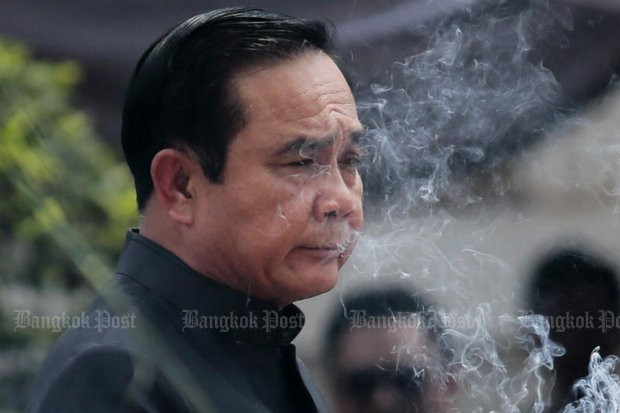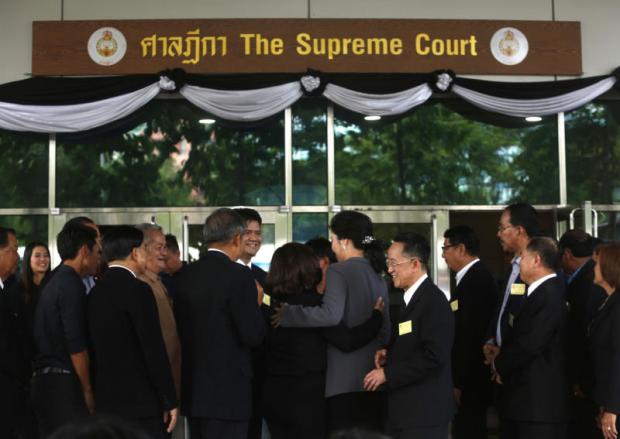Showing 31 - 40 of 69
Singapore a lesson for subpar countries
News, Thitinan Pongsudhirak, Published on 29/06/2018
» It would seem a cliché to say Singapore has figured it out. But it has, more or less, especially when compared to its subpar neighbours.
Prime Minister Prayut is no President Xi
News, Thitinan Pongsudhirak, Published on 16/03/2018
» That the Chinese Communist Party-controlled legislature has removed the term limits of the country's president and vice president has already sent shockwaves worldwide. It means that President Xi Jinping can continue to be China's head of state into a third term beyond 2023. Even though China's presidency is less powerful than the Chinese Communist Party's General Secretary and head of the Central Military Commission, the abolition of presidential term limits sends unmistakable signals that President Xi intends to hold complete and absolute power. He is now seen as more powerful than any contemporary Chinese leader, unrivalled since the time of founding father Mao Zedong.
A year of living dangerously in Thailand
News, Thitinan Pongsudhirak, Published on 05/01/2018
» They were supposed to be in power for the royal transition but they have stayed too long and now want to win an unavoidable election.
Thailand needs to arrive in 21st century
News, Thitinan Pongsudhirak, Published on 03/11/2017
» Thai politics is fundamentally not about the colours of yellow versus red or of democratic rule against military dictatorship. At its core, modern Thailand is about the socio-political and developmental totality of the past seven decades from 1947 to 2017 during the 9th reign, divided into the first five and the last two, demarcated by the Cold War and the 21st century. For Thailand to arrive in the 21st century, it needs to reconcile the overlapping forces of these two eras that now harbour conflicting interests and preferences through compromise and mutual accommodation. This is now the existential task ahead after King Bhumibol Adulyadej's glorious reign.
Royal transition explains military's grip
News, Thitinan Pongsudhirak, Published on 13/10/2017
» Hindsight will look back at Thailand's prolonged political interregnum after the military coup on 22 May 2014 with perplexity and astonishment. It will be remembered as a time of junta rule in a country that had overthrown military dictatorships repeatedly in 1973 and 1992. This time, the self-styled strongman from the barracks was Gen Prayut Chan-o-cha, who would end up in office for longer than most elected leaders before him. There will be many questions and criticisms of Gen Prayut's tenure and rule but undergirding them will be his unrivalled role a year ago today, on 13 Oct 2016, with the passing of King Bhumibol Adulyadej. The consequent royal transition is likely to be viewed in posterity as the principal reason why the Thai people have had to put up with Gen Prayut.
A way out after two trials in two decades
News, Thitinan Pongsudhirak, Published on 25/08/2017
» Once again, Thailand is gripped by another high-profile court trial in yet another round of political brinkmanship. The much anticipated verdict today on Yingluck Shinawatra's handling of the rice-pledging scheme while in office is reminiscent of her eldest brother Thaksin Shinawatra's assets concealment case 16 years ago. In fact, Thailand's political landscape so far in the 21st century can now be book-ended by these two politicised cases that are likely to end up with different outcomes while going in the same direction. In turn, the Yingluck verdict can serve as another reminder of what Thailand needs to do to move on from its two-decade political malaise underpinned by half a dozen elections, violent street protests, and two military coups.
Asean regionalism amid authoritarianism
News, Thitinan Pongsudhirak, Published on 05/08/2017
» If three Asean members -- Indonesia, Myanmar and the Philippines -- have led the way in shedding their authoritarian past, three others -- Thailand, Cambodia and Malaysia --have gone the other way. After 50 years of ups and downs in domestic politics and governance, Asean has seen a resurgence of authoritarian practices. How this trend is manifested, and whether it intensifies or reverts to more democratic characteristics, will determine how Asean's regionalism takes shape over the next few decades.
Shifting Thai alliances in the 21st century
News, Thitinan Pongsudhirak, Published on 21/07/2017
» In view of rising geopolitical tensions in Asia, Thailand's foreign policy strategy and posture has come into focus.
Thailand's challenges, lessons from '97 crisis
News, Thitinan Pongsudhirak, Published on 30/06/2017
» It is hard to believe today but Thailand appeared on the verge of economic doom 20 years ago. The culmination of financial sector convulsions, compounded by a currency crisis and reinforced by corruption and cronyism, induced a forced devaluation of the baht on July 2, 1997. Back then, the Thai economy was in dire straits but politics looked promising. It is the opposite today, as macroeconomic conditions have become sound but the political system has reverted to a military dictatorship with doubtful prospects for popular rule.
'Zbig': Renowned geopolitical maestro
News, Thitinan Pongsudhirak, Published on 30/05/2017
» Last week's death of Zbigniew Brzezinski, the renowned thinker, writer and practitioner of geopolitics throughout the Cold War and onetime national security adviser to former US president Jimmy Carter in the late 1970s, has elicited generally positive global reviews and assessments of his achievements. He died on Friday at the age of 89.













